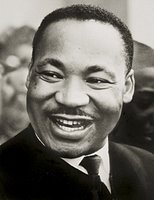Martin Luther King, Jr.
Commemoration
Martin Luther King, Jr., 15 January
Martin Luther King, Jr., 15 January

"Injustice anywhere is a threat to justice everywhere."
Throughout history, human rights violations have plagued our earth. From the persecution of Christians in the Roman Empire, to genocide in Rwanda, to the quality of education in the inner cities, diverse peoples have struggled to survive in a world often filled with fear and hatred. The problem is evident. Without a universal respect for human rights, the world cannot achieve peace. Violations of our inherent rights represent an absence of value and respect for human life. Our peace heroes are those individuals who have expressed a sincere compassion to alleviate the sufferings of others. Dr. Martin Luther King, Jr. is such a peace hero. He led a heroic mission to educate, awaken, and revolutionize the American people to fight the injustices inflicted upon African Americans. But, like Gandhi, he fought the injustices with love, respect, and non-violent protest.
Born on January 15, 1929, Martin Luther King Jr. was not a stranger to racial discrimination. The democratic liberal values promised to the American citizen were shadowed and debased by racial inequalities. In the late 1950s, segregation in schools, lunch counters, and other public facilities was prevalent. Furthermore, African Americans did not have the right to vote and were denied many economic opportunities enjoyed by others. Raised in a society engulfed by oppression and humiliation, King believed that he had a social and moral responsibility to educate the nation about the evils of racism.
With a Ph.D. in Theology from Boston University, King encouraged his believers to participate in a non-violent mission to achieve those freedoms constitutionally guaranteed to each and every individual. On December 1, 1955, Rosa Parks boarded a bus in Montgomery, Alabama, and refused to move to the back for a white passenger. Her subsequent arrest rallied King and his followers to begin a surge of boycotts. Inspired by the success of the Montgomery boycotts, other movements began spreading, protesting racial discrimination across the South. These movements became the heart of King's non-violent crusade for peace.
King's peace mission followed the lessons taught by other peace heroes such as Mahatma Gandhi. His technique was known as a non-violent resistance, using love, prayer, and speech as direct action against physical violence. King taught love instead of hate, kindness instead of aggression. The act of nonviolent resistance displayed the protester's courageous will to bring peace and dignity to the nation.
King's nonviolent pledge for peace is unique, because in the past heroes were often those who used violence to fight injustice. When his house was bombed, he preached "We're going to fight but not kill." When 600 members of the Southern Christian Leadership Conference marched from Selma to Montgomery, Alabama, they were attacked by state troopers, trampled by horses, and many were hospitalized. When King heard of the events on March 7, 1965, Bloody Sunday, he called for another march on City Hall. They were stopped again by the state troopers, and to avoid arrest King and marchers knelt and prayed. As a peace hero, King fought his oppressors with a higher conscience.
Throughout his life, King played a vital role in achieving significant gains for humanity. From the desegregation of schools and other public facilities, to the acceleration of civil rights as a government priority, his peace mission was a success. In 1964, at the young age of 35, King was awarded a Nobel Peace Prize for his accomplishments. King's legacy offers a hope that someday racism might be replaced with love and respect for human rights.
written by Andrea Walker
Prayer
O God, fashion and mold our memories into a guiding vision for active discipleship, so that we may not only long and yearn for thy coming kingdom but may also recognize its arrival and presence in the risen Christ Jesus, the Lamb of God, who takes away the sins of the world, in whose blessed name we pray. Amen.
written by The Reverend Dr. Randolph Nugent


0 Comments:
Post a Comment
<< Home